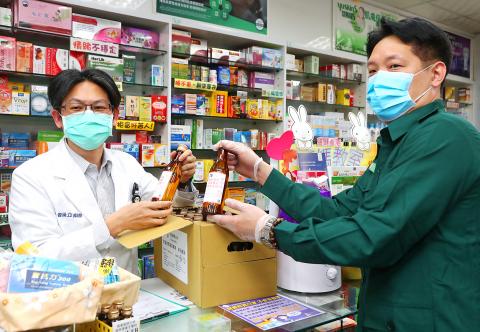Starting this week, Chunghwa Post is to be in charge of delivering 75 percent alcohol used as a disinfectant to protect against COVID-19, the postal company said yesterday.
The state-run firm undertook the task after it was last week ordered to deliver masks to be sold at National Health Insurance (NHI) partner pharmacies.
Taiwan Tobacco and Liquor Corp (TTLC) produces the 75 percent alcohol, Department of Mail Business and Operations head Chen Ching-hsiang (陳敬祥) said.

Photo: CNA
TTLC would first deliver the alcohol to 23 postal service hubs, from which couriers would deliver it to the NHI’s 5,660 partner pharmacies nationwide, he said.
Chen said that each partner pharmacy would receive three boxes, each containing 24 300ml bottles of alcohol.
As alcohol is flammable, couriers would be required to deliver the boxes in four-wheeled vehicles or larger trucks that are equipped with fire extinguishers, Chen said.
They would also be told to place the boxes in plastic containers for enhanced safety, he added.
Delivering masks and alcohol would increase couriers’ workloads, but many of them feel honored to be part of national disease-prevention efforts, Chen said.
Chunghwa Post would pay couriers overtime or allow them to take compensatory days off due to their increased workload, he said, adding that it would also have to employ more couriers.
The demand for additional couriers is urgent, as from today, the number of masks to be delivered by Chunghwa Post is to increase from 1.65 million to 3.96 million per day, Chen said.

Alain Robert, known as the "French Spider-Man," praised Alex Honnold as exceptionally well-prepared after the US climber completed a free solo ascent of Taipei 101 yesterday. Robert said Honnold's ascent of the 508m-tall skyscraper in just more than one-and-a-half hours without using safety ropes or equipment was a remarkable achievement. "This is my life," he said in an interview conducted in French, adding that he liked the feeling of being "on the edge of danger." The 63-year-old Frenchman climbed Taipei 101 using ropes in December 2004, taking about four hours to reach the top. On a one-to-10 scale of difficulty, Robert said Taipei 101

Nipah virus infection is to be officially listed as a category 5 notifiable infectious disease in Taiwan in March, while clinical treatment guidelines are being formulated, the Centers for Disease Control (CDC) said yesterday. With Nipah infections being reported in other countries and considering its relatively high fatality rate, the centers on Jan. 16 announced that it would be listed as a notifiable infectious disease to bolster the nation’s systematic early warning system and increase public awareness, the CDC said. Bangladesh reported four fatal cases last year in separate districts, with three linked to raw date palm sap consumption, CDC Epidemic Intelligence

Two Taiwanese prosecutors were questioned by Chinese security personnel at their hotel during a trip to China’s Henan Province this month, the Mainland Affairs Council (MAC) said yesterday. The officers had personal information on the prosecutors, including “when they were assigned to their posts, their work locations and job titles,” MAC Deputy Minister and spokesman Liang Wen-chieh (梁文傑) said. On top of asking about their agencies and positions, the officers also questioned the prosecutors about the Cross-Strait Joint Crime-Fighting and Judicial Mutual Assistance Agreement, a pact that serves as the framework for Taiwan-China cooperation on combating crime and providing judicial assistance, Liang

US climber Alex Honnold left Taiwan this morning a day after completing a free-solo ascent of Taipei 101, a feat that drew cheers from onlookers and gained widespread international attention. Honnold yesterday scaled the 101-story skyscraper without a rope or safety harness. The climb — the highest urban free-solo ascent ever attempted — took just more than 90 minutes and was streamed live on Netflix. It was covered by major international news outlets including CNN, the New York Times, the Guardian and the Wall Street Journal. As Honnold prepared to leave Taiwan today, he attracted a crowd when he and his wife, Sanni,